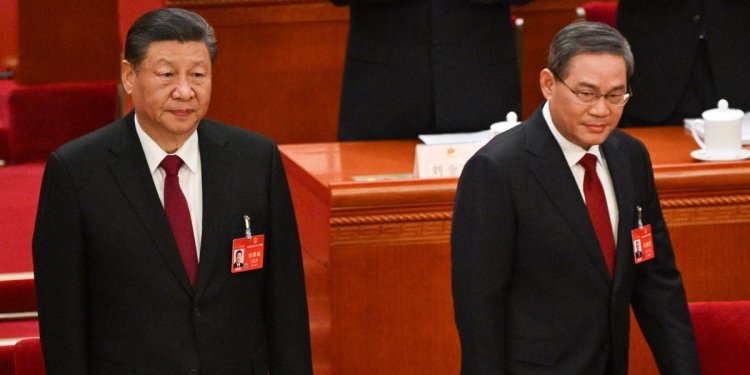China is laying out ambitious growth goals for 2024, and even Beijing knows they'll be hard to hit
China — the world's second-largest economy — is targeting GDP growth of around 5% in 2024. The country's GDP grew 5.2% in 2023.

Pedro Pardo/AFP/Getty Images
- China's premier, Li Qiang, announced a 5% economic growth target for 2024.
- The ambitious goal faces headwinds like a property crisis, deflationary pressure, and a demographic crisis.
- Economists suggest Beijing may need to inject more stimulus into its economy to reach the target.
China is laying out ambitious growth goals for 2024, and Beijing knows they'll be hard to hit.
China — the world's second-largest economy — is targeting economic growth of around 5% this year, Li Qiang, the country's premier, announced on Tuesday. In comparison, China's GDP grew 5.2% in 2023. This was after a brief growth spurt early in the year following the lifting of lockdowns.
It's an ambitious target. The country is battling significant headwinds including a property crisis, deflationary pressure, and a demographic crisis.
Li acknowledged there are challenges ahead for China while delivering his first work report at the annual meeting of the National People's Congress.
"Achieving this year's expected goals is not easy," said Li, who took office as premier in March 2023. "It requires focused policies, redoubled efforts, and concerted efforts from all parties."
Economists, too, expect the going to be tough for China.
"Achieving the 'around 5%' growth target will be very challenging," Nomura economists wrote in a note on Tuesday.
The economists said the key challenges China faces are a "still faltering property sector, the crackdown on local government debt accumulation in 12 high-risk provinces, the likely significant slowdown of investment in the new energy sector, and the lacklustre data so far available for January and February."
ING also thinks the going will be "challenging" as consumption this year is unlikely to be as strong as it was last year due to weak consumer confidence, wrote Lynn Song, the Dutch bank's chief economist for Greater China.
"Trade is unlikely to be a major engine of growth as well, with global trade growth expected to remain below historical averages," particularly amid heightened trade protectionism, added Song.
Economists are watching to see whether Beijing will inject more stimulus into its economy to help it hit its 5% growth target.
Li announced 1 trillion yuan, or $139 billion, of "ultra-long" special central government bonds to stimulate the economy, but more can be done, wrote the Nomura economists. They suggested boosting central government and regional government spending.
As Deutsche Bank's analysts wrote about China's efforts to drive its economy, "the market's big question will be whether they can back up their growth target with enough stimulus."
China and Hong Kong markets don't appear encouraged by Li's announcement.
Hong Kong's Hang Seng Index was down 2.7% at 3:49 p.m. local time on Tuesday. The Hang Seng China Enterprises Index was also 2.7% lower.
China's blue-chip CSI300 Index edged up 0.7%.
What's Your Reaction?




















